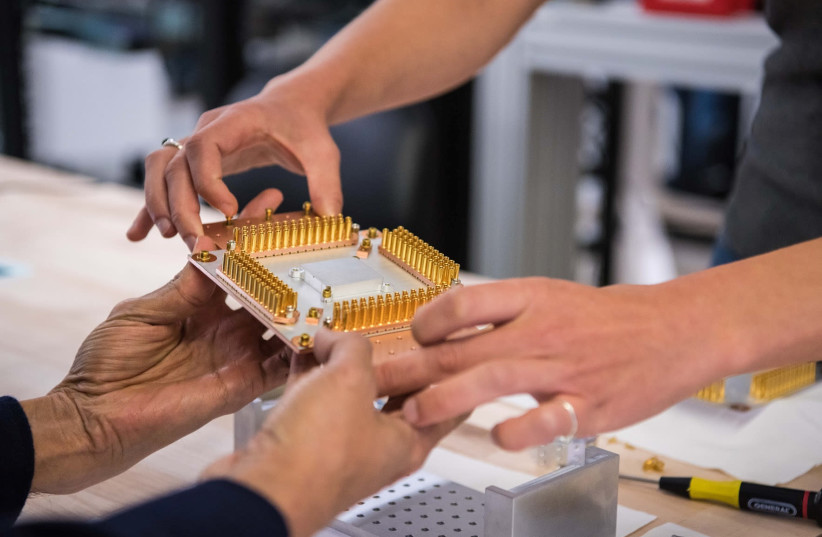The Defense Ministry’s Directorate of Research and Development (MAFAT) and the Innovation Authority announced on Tuesday that they will invest around NIS 200 million toward building Israel’s first quantum computer.
“A quantum computation capability will provide the technological infrastructure for an Israeli eco-system that will be a leader in future developments in the security, economic, technological, engineering and scientific arenas,” a statement said.
Quantum computing, once it is fully mature, is expected to revolutionize not only computing speed, but a variety of military strategic and detection issues, as well as having massive economic dimensions and forcing the entire internet to alter its basic encryption baseline.
Experts in the field often say that today’s supercomputers will look like the stone age in comparison to the quantum paradigm shift which will replace them.
According to the statement, the Innovation Authority and the Defense Ministry will work on two different though parallel paths.

The Innovation Authority will work on developing more immediate ways to build quantum computing infrastructure and applications, which will allow more immediate testing and targeted practical uses of a quantum computer.
These moves may include backpacking off of existing quantum computing technologies from allies, including via cloud connections.
The US and China are by far the leaders in developing quantum computers, with Google having carried out the first successful academic quantum computer calculation in 2019 and several companies, such as IonQ, having already developed smaller quantum computer models.
Google has projected it will build a full-fledged quantum super computer by 2029, while IonQ has said its next generation medium-size quantum computers may be making waves in the financial industry already in the next couple years.
Canada and a number of EU countries are also making major strides in this area.
Tuesday’s statement said that the Defense Ministry would work on a longer-term basis to build all aspects of an Israeli quantum computer from the ground up, to ensure that Israel has its own home-grown capability.
The ministry is expected to work with Israeli academics and defense industry experts to eventually achieve a full-fledged quantum computer.
Until now, Israel spent the last few years raising its investment in the quantum field significantly in non-computing areas, such as quantum communication and quantum sensors.
For example, Rafael is working with the ministry and the IDF on a variety of quantum sensor issues.
A much larger budget and a longer-term sustained commitment, such as the newly allotted NIS 200 million, was needed to be able to dive into the deeper and more complex pool of quantum computing.
It was unclear whether Israel’s goal is to build a smaller IonQ-style quantum computer, a medium-size one like Google or to race with the Internet tech giant and others for the much larger and full-fledged quantum computer that even Google sees as seven or more years away.
INNOVATION AUTHORITY director Dror Bin said that Israel “could not ignore” the capabilities, technology and industry the world is moving toward in quantum computing. “The industry must develop knowledge and access to infrastructure that will enable developing the engines of growth for activities in which it has a strong basis to be a leader.”
Dr. Danny Gold, director of the Defense Ministry’s Directorate of Research and Development said that “Quantum computing, in all of its parameters, has been designated as an important component to the future security of the state and its technological supremacy,” versus its regional adversaries.
The new moves are “a substantial step forward toward building Israeli independence in this area,” he said.
Quantum is the state of things being unknown at the subatomic level until they can be observed. Instead of the classic computer “bit” (an eighth of a byte, as in megabyte), it uses “qubits” – quantum bits.
A traditional bit can only have a value of either 0 or 1; a qubit can simultaneously have both.
The reason this impossibility is possible is because of quantum’s subatomic level where protons and electrons are acting in a wild way beyond the rules of nature as we have thought of them until now.
Think of the Avengers’ superhero Antman shrinking into the quantum zone where time did not even move in a linear fashion.
In computer terms, once the values of 0 and 1 can happen at the same time, it allows the quantum computer to consider trillions of possibilities or more in the same instant, dwarfing the number of calculations that our traditional computers can do, stuck in binary counting.
This process is called superposition.
Superposition ends once the specialized qubit particle slows and becomes observable, thereby emerging from its quantum state.
We stick the qubit in an artificial “space vacuum” so that it does not get observed or interfered with and remains dynamic – because the observing of it itself interferes with its integrity.
Pictures of quantum computers often show tubes the size of a household refrigerator. But most of the tubing is not the central computer processor but rather the process used to maintain the qubits at the absolute zero quantum state.
